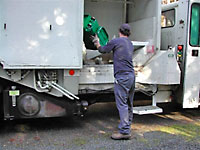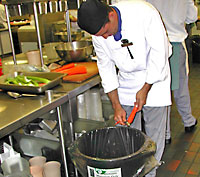Zero Waste
 BACKGROUND
BACKGROUNDIn 2002, the Regional District of Nanaimo committed to "Zero Waste" as its long-term waste reduction and diversion target.

Zero Waste focuses on reducing the region's environmental footprint by minimizing the amount of waste that must be landfilled through reduction, reuse, recycling, redesign, composting, and other actions. The RDN was the first jurisdiction on Vancouver Island and one of several forward looking local governments in Canada and around the world to move beyond recycling and adopt a Zero Waste approach to eliminating waste.
What is Zero Waste?
Zero Waste is:- A goal and a process that involves individuals, communities and local, provincial and federal governments and a vision of a future where garbage is a thing of the past.
- A movement that began by asking the simple question, "why have our recycling efforts hit a plateau?". One reason is that after targeting 50% diversion and achieving it, people had lost interest in going further. It was clear to those involved in waste management that further gains in waste reduction and recycling could be achieved but that the will to pursue them was lacking.
- Inspires us to revisit our goals, and apply our knowledge to the problems that persist. Once the possibility of Zero Waste is accepted, all waste looks different.
- Is about the knowledge and understanding that we all need to be responsible in our use of resources and our impact on the planet.
 The Residential Food Waste Collection Pilot Project is one of several Zero Waste Plan initiatives now underway.
The Residential Food Waste Collection Pilot Project is one of several Zero Waste Plan initiatives now underway.
Zero Waste initiatives are an integral part of the RDN's Solid Waste Management Plan, which has set an interim goal of diverting 75% of the region's waste from the landfill by 2010. The Solid Waste Management Plan is a long-term vision of how the regional district will manage its solid waste, including diversion and future disposal needs.
Some of the Zero Waste programs, projects and research in the Solid Waste Management Plan include:- Residential Food Waste Collection Pilot Project
- Commercial Organics Diversion Program
- Residential Garbage and Recycling Program
- Zero Waste Promotion and Education
- Illegal Dumping Prevention Program
- Construction/Demolition Waste Diversion Strategy
- Solid Waste Composition Study
The RDN and its member municipalities, residents and businesses have led the way in innovative approaches to reducing the amount of garbage that must be landfilled. In 1991, we introduced Canada's first user pay residential garbage collection system. Since then, the RDN and its partners have expanded curbside recycling programs, banned paper, metal, commercial food waste, clean wood waste and other recyclable materials from the landfill, and successfully promoted composting throughout the region.
 The RDN Commercial Food Waste Diversion program now diverts more than 6,000 tonnes of food waste annually from the Regional Landfill.
The RDN Commercial Food Waste Diversion program now diverts more than 6,000 tonnes of food waste annually from the Regional Landfill.
- 1989 - Residents and businesses divert 10% of solid waste from the landfill.
- 1995 - Recycling, reuse and recycling initiatives divert 26% of solid waste from the landfill.
- 2000 - The RDN and its municipal partners divert 57,000 tonnes of material from the landfill or 54% of the total waste generated in the region, exceeding the 50% target set by the provincial government.
- 2002 - The RDN adopts Zero Waste as its long-term waste diversion target.
- 2004 - The RDN prepares an updated Solid Waste Management Plan which sets an interim goal of diverting 75% of the region's waste from the landfill by 2010.
- 2005 - The RDN bans commercial food waste from the landfill. A commercial food waste diversion program involving businesses and organizations diverts more than 6,000 tonnes of food waste and organic compostables annually from the landfill.
- 2007 - The RDN and its municipal partners launch a residential food waste collection pilot project that will provide the information needed to develop a region-wide program.
More information
Check out the Links and Resources to learn more about Zero Waste. There are also links to learn about product stewardship and our easy-to-use on-line Recycling Directory.
